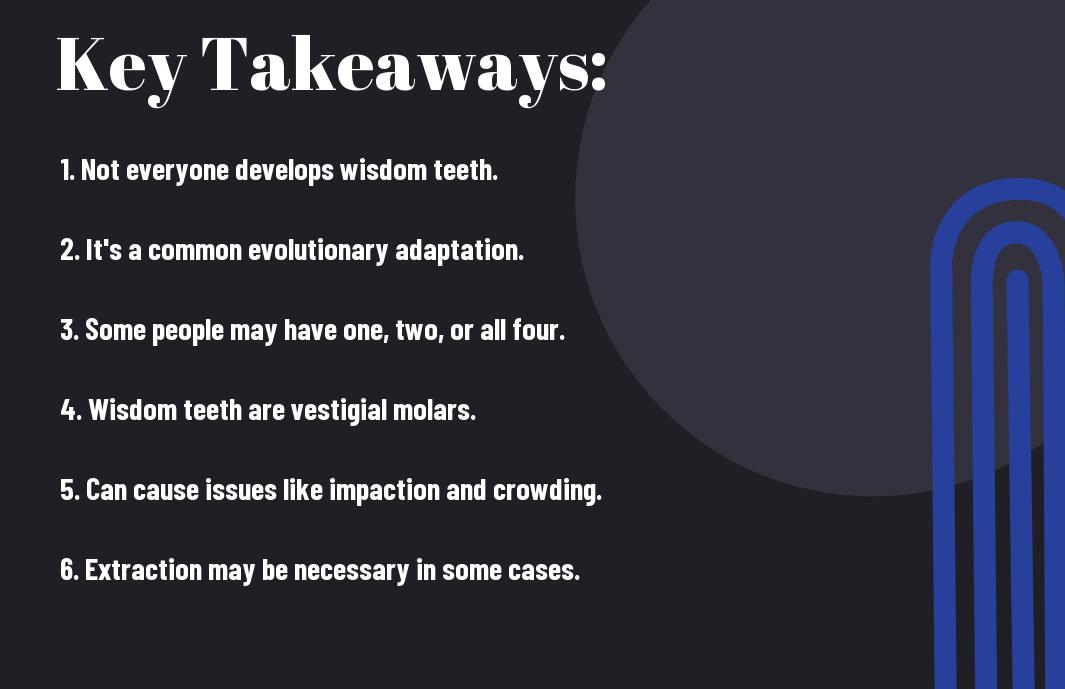Discovered in the 17th century, wisdom teeth are the third set of molars that typically emerge during late adolescence or early adulthood. While these teeth are often associated with pain and discomfort, I am here to answer the burning question: does everyone have wisdom teeth, or is it universal? As an expert in dental health, I can confidently say that not everyone has wisdom teeth. In fact, many individuals are born without these molars, while others may have them but experience no issues at all. However, for those who do develop wisdom teeth, it is important to be aware of the potential complications that can arise, including impaction, crowding, and infection. In this blog post, I will delve into the surprising truth about wisdom teeth and provide helpful insights for maintaining optimal oral health.
Key Takeaways:
- Wisdom teeth are not universal: Not everyone develops wisdom teeth, and some people may only have one, two, or none at all.
- Evolutionary factor: The need for wisdom teeth has decreased over time due to changes in diet and jaw size.
- Potential issues: For those that do develop wisdom teeth, they can often cause problems such as impaction, crowding, and infection.
- Extraction may be necessary: Many individuals end up needing their wisdom teeth removed to prevent complications and maintain oral health.
- Individual differences: The presence, position, and development of wisdom teeth can vary greatly from person to person.
What are Wisdom Teeth?
Before we dive into the question of whether everyone has wisdom teeth, let’s first understand what wisdom teeth are. Also known as third molars, wisdom teeth are the last set of molars to emerge in the back of your mouth. They typically appear during late adolescence or early adulthood, between the ages of 17 and 25.
Definition and Function
Wisdom teeth are the third and final set of molars that most people get in their late teens or early twenties. These teeth were necessary for our ancestors, who ate diets that were harder and tougher to chew. Over time, as our diets changed and our jaws became smaller, many people no longer have enough room in their mouth for these teeth to emerge properly.
Development and Eruption
Wisdom teeth can cause various issues, including impaction, infection, and crowding of the surrounding teeth. Many people experience pain and discomfort as their wisdom teeth develop and attempt to emerge. In some cases, wisdom teeth may only partially emerge, leading to increased risk of infection and other dental problems. The development and eruption of wisdom teeth can be a source of concern for many young adults.

Prevalence of Wisdom Teeth
The The End of Wisdom Teeth? – West Palm Beach Dentist has been a topic of interest for many people, and the prevalence of wisdom teeth among different populations is often a subject of curiosity.
Worldwide Distribution
The prevalence of wisdom teeth varies among different populations worldwide. While some ethnic groups have a high prevalence of wisdom teeth, others have a lower occurrence. Studies have shown that certain Asian populations, such as the Inuit and the Taiwanese aborigines, have a lower prevalence of wisdom teeth compared to people of European descent.
Factors Affecting Presence
There are several factors that can affect the presence of wisdom teeth in individuals. Genetics play a significant role in determining whether a person will develop wisdom teeth. Other factors such as diet, environmental conditions, and evolutionary changes also contribute to the prevalence of wisdom teeth in different populations. Additionally, the position of the teeth in the jaw and the size of the jaw can impact whether there is enough space for wisdom teeth to emerge. Recognizing these various factors can help us understand why some people may have wisdom teeth while others do not.
Complications and Considerations
To understand the potential complications and considerations related to wisdom teeth, it’s important to address two key aspects: impaction and dental issues, as well as the process of removal and management.
Impaction and Dental Issues
Impacted wisdom teeth occur when there is not enough space in the mouth for the teeth to emerge properly. This can lead to a range of dental issues, including crowding, infection, and damage to neighboring teeth. If left untreated, impacted wisdom teeth can cause significant pain and discomfort, and may even lead to more serious complications such as cysts or tumors. It’s important to monitor the development of wisdom teeth and seek professional dental advice if you experience any symptoms of impaction.
Removal and Management
When it comes to managing wisdom teeth, removal is often the recommended course of action to prevent potential complications. Wisdom tooth extraction is a common dental procedure that can alleviate pain and reduce the risk of dental issues associated with impacted teeth. It’s important to consult with a dental professional to discuss the best approach for your specific situation. I highly recommend seeking the expertise of a qualified dentist to evaluate and address any potential issues with your wisdom teeth.

Does Everyone Have Wisdom Teeth – Is It Universal?
With this in mind, it is important to note that not everyone will develop wisdom teeth. In fact, some individuals may only develop one or two, while others may not develop any at all. This variation in formation is due to evolutionary changes in the human jaw size and structure. While wisdom teeth may have served a functional purpose for our ancestors, they are not essential for modern humans. Furthermore, the presence of wisdom teeth can also lead to dental issues such as impaction, crowding, and infection. If you are experiencing discomfort or dental problems related to your wisdom teeth, it is important to consult with a dentist to determine the best course of action for your specific situation.
Wisdom Teeth FAQ
Q: Does everyone have wisdom teeth?
A: No, not everyone has wisdom teeth. Some people are born without them, while others may have one, two, three, or all four wisdom teeth. Additionally, some individuals may have more than four wisdom teeth, known as supernumerary teeth.
Q: At what age do wisdom teeth typically come in?
A: Wisdom teeth typically emerge between the ages of 17 and 25, although this timeline can vary from person to person. Some individuals may experience their wisdom teeth coming in earlier or later in life.
Q: Do wisdom teeth always need to be removed?
A: Not everyone needs to have their wisdom teeth removed. However, if the wisdom teeth are impacted, causing pain, crowding, or affecting the surrounding teeth, removal may be necessary. It’s important to consult with a dentist or oral surgeon to determine the best course of action for your individual situation.
Q: What are the signs that wisdom teeth may need to be removed?
A: Signs that wisdom teeth may need to be removed include pain or stiffness in the jaw, difficulty opening the mouth, red or swollen gums, bad breath, an unpleasant taste in the mouth, or difficulty properly brushing or flossing the back teeth. X-rays can help determine the position of the wisdom teeth and if they are causing issues.
Q: Are there any risks associated with keeping wisdom teeth?
A: Keeping wisdom teeth that are causing issues can lead to a variety of risks, including infections, damage to surrounding teeth, cysts or tumors, and misalignment of the teeth. It’s important to regularly see a dentist for check-ups to monitor the development and health of your wisdom teeth.









Leave a comment